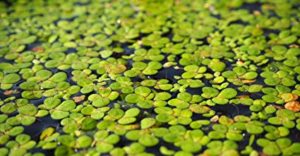Is Duckweed a Reliable Source of Vitamin B12?
By Reed Mangels, PhD, RD

Duckweeds (also known as water lentils) are plants that grow on lakes and ponds and that are eaten by ducks, geese, and swans. Some species of duckweed have been traditionally eaten by people in Asian countries. For example, in Thailand, duckweed is used in salads and vegetable curries and is found in vegetable markets where it may be called khai nam, kai-pum, or kai nhae (1).
Duckweed has been recently investigated as a source of nutrients including protein (1). Questions have arisen about duckweed’s vitamin B12 content. So far, only one peer-reviewed study has examined this. Researchers reported that a dish made from Mankai duckweed contained vitamin B12 (2). No details were provided of the method used to analyze vitamin B12 which is concerning since some methods measure inactive vitamin B12 analogs (3, 4).
When questioned about their methodology (3), the researchers said that they used a method that does not distinguish between active vitamin B12 and vitamin B12 analogs (5). They also said that they did another kind of test that found that there was some active vitamin B12 in the duckweed although no details were provided about how much active vitamin B12 was present (5).
Unless a food has consistently been shown to improve vitamin B12 status in humans, as measured by reducing blood levels of methylmalonic acid, it cannot be considered a reliable source of vitamin B12 (4). There are no published reports in peer-reviewed scientific literature of duckweed improving human vitamin B12 status.
The bottom line: More research needs to be conducted and subjected to peer review, before duckweed (or water lentils) can be considered a reliable source of vitamin B12 for humans.
For more information about vitamin B12, including vegan sources of vitamin B12, see Vitamin B12 in the Vegan Diet.
References
1. Appenroth KJ, Sree KS, Bog M, et al. Nutritional value of the duckweed species of the genus Wolffia (Lemnaceae) as human food. Front Chem. 2018 Oct 29;6:483
2. Kaplan A, Zelicha H, Tsaban G, et al. Protein bioavailability of Wolffia globosa duckweed, a novel aquatic plant – A randomized controlled trial. Clin Nutr. 2019 Dec;38(6):2576-2582. doi: 10.1016/j.clnu.2018.12.009.
3. Jahreis G, Appenroth KJ, Sree KS, Dawczynski C. Letter to original article by Kaplan et al. 2018 – Protein bioavailability of Wolffia globosa duckweed, a novel aquatic plant, A randomized controlled trial. Clin Nutr. 2019 Oct;38(5):2463. doi: 10.1016/j.clnu.2019.07.007.
4. Norris J. Vitamin B12. Vegan Health website. https://veganhealth.org/vitamin-b12/
5. Kaplan A, Lapidot M, Sela I, Shai I. RE: Protein bioavailability of Wolffia globosa duckweed, a novel aquatic plant, a randomized controlled trial. Clin Nutr. 2019 Oct;38(5):2464. doi: 10.1016/j.clnu.2019.08.007
The contents of this posting, website and our other publications, including Vegetarian Journal, are not intended to provide personal medical advice. Medical advice should be obtained from a qualified health professional. We often depend on product and ingredient information from company statements. It is impossible to be 100% sure about a statement, info can change, people have different views, and mistakes can be made. Please use your best judgment about whether a product is suitable for you. To be sure, do further research or confirmation on your own.
